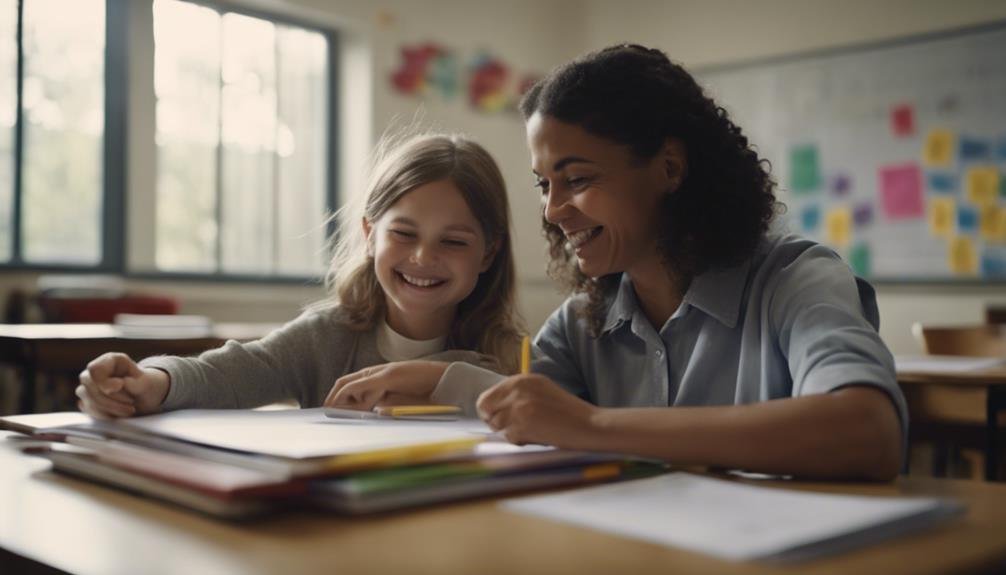"Cherishing Little Steps - A Haven for Baby and Family Journeys"
Parent-Teacher Communication: Tips for a Successful Partnership
When traversing the intricate landscape of fostering collaborative relationships between parents and teachers, a delicate dance of effective communication is required.
Understanding the nuances and strategies that can enhance this partnership is key. Imagine the benefits of a seamless flow of information between home and school, leading to a shared goal of nurturing a child's growth and success.
But how can you guarantee this harmonious collaboration? Let's explore practical tips and insights that can pave the way for a strong parent-teacher alliance.
Key Takeaways
- Build relationships with parents through open dialogue and active listening.
- Set clear communication boundaries and guidelines to minimize misunderstandings.
- Utilize technology for efficient communication and a strong partnership.
- Acknowledge and celebrate accomplishments to boost student motivation and self-esteem.
Establishing Trust and Rapport

To build a strong foundation for effective parent-teacher communication, establishing trust and rapport is essential. Building relationships with parents is the cornerstone of a successful partnership. Begin by creating a welcoming environment where parents feel valued and respected. Encourage open dialogue and active listening to foster collaboration. Share your insights about the child's progress and behavior, and be receptive to parental concerns and perspectives.
Establishing trust takes time and effort. Consistent, honest communication is key to nurturing this trust. Keep parents informed about classroom activities, upcoming events, and their child's achievements. Be transparent about challenges the child may be facing and work together to address them. By involving parents in decision-making processes, you create a sense of shared responsibility for the child's education.
Setting Clear Communication Expectations
Establishing trust and rapport is just the beginning; now, it's time to clearly outline communication expectations to guarantee a successful partnership between parents and teachers. Setting clear communication boundaries and guidelines is essential for fostering effective feedback and open dialogue between both parties.
To secure a productive relationship, it's important to establish how often you'll communicate, preferred methods of contact, and the type of information that will be shared. By setting these clear guidelines from the start, misunderstandings can be minimized, and both parents and teachers can feel confident in their communication approach.
Effective feedback is a critical component of this partnership. Parents should feel comfortable expressing their concerns or asking questions, while teachers should provide timely updates on a child's progress and any areas of improvement. Encouraging an open dialogue where both parties feel heard and valued creates a cooperative environment focused on the child's best interests.
Embracing Technology for Communication

Utilizing technology for communication can enhance the efficiency and effectiveness of parent-teacher interactions. By incorporating apps designed for educational communication, such as messaging platforms or school-specific applications, you can easily stay connected with your child's teacher. These apps provide a convenient way to receive updates on your child's progress, upcoming assignments, and school events.
Email updates are another valuable tool for maintaining open lines of communication with your child's teacher. Teachers often use email to share important information, such as curriculum updates, classroom activities, and ways you can support your child's learning at home. Responding promptly to these emails shows your engagement and dedication to your child's education.
In today's fast-paced world, embracing technology for communication is vital for fostering a strong parent-teacher partnership. By utilizing apps and staying proactive with email updates, you can make sure that you're always informed and involved in your child's educational journey.
Scheduling Regular Check-Ins
Stay connected and build a strong partnership by consistently scheduling regular check-ins with your child's teacher. Weekly meetings or phone calls can be incredibly beneficial in keeping track of your child's progress and addressing any concerns that may arise.
Setting up a weekly meeting with your child's teacher can provide a structured time to discuss academic performance, behavior, and any other important matters. These regular meetings allow for open communication, fostering a collaborative approach to support your child's learning journey.
Additionally, phone calls can offer a convenient way to touch base with the teacher when an in-person meeting isn't feasible.
Providing Timely Updates on Progress

To guarantee effective communication and support your child's academic journey, provide timely updates on their progress to their teacher. Keeping the communication channels open ensures that both you and the teacher are in alignment in helping your child succeed.
Here are some ways to provide these updates effectively:
- Progress Reports: Regularly review and discuss progress reports with your child's teacher to stay informed about their academic performance.
- Communication Logs: Utilize communication logs to jot down any concerns or achievements your child experiences, making it easier to share with the teacher.
- Parent-Teacher Meetings: Attend scheduled parent-teacher meetings or request them to discuss your child's progress face-to-face.
Utilizing online platforms can also be a convenient way to keep track of your child's progress and share updates with the teacher promptly. By staying engaged and proactive in providing timely updates, you strengthen the partnership between home and school for the benefit of your child's education.
Addressing Concerns Promptly and Respectfully
When addressing concerns promptly and respectfully with your child's teacher, it's important to approach the conversation with honesty and clarity to guarantee effective collaboration towards your child's academic success. Initiate an open dialogue with the teacher, expressing your worries or questions in a constructive manner. Remember, both you and the teacher share a common goal – to support your child's learning journey.
Be specific about the issue at hand, providing examples if possible. This clarity helps the teacher understand your perspective and work towards a solution. Listen attentively to the teacher's viewpoint and be open to receiving constructive feedback. Remember, this is a partnership aimed at helping your child thrive academically.
Maintain a respectful tone throughout the conversation, acknowledging the teacher's expertise and commitment to your child's development. Together, brainstorm potential strategies to address the concern and agree on a plan of action. By engaging in open, honest communication and showing mutual respect, you pave the way for a successful partnership that benefits your child's educational experience.
Encouraging Parental Involvement in Learning

Get involved in your child's learning journey by actively participating in their educational experiences both at school and at home. Encouraging parental involvement in learning is important for your child's academic success and overall development.
Here are three key ways you can enhance your engagement:
- Establish a Routine: Create a study schedule at home that includes dedicated time for homework, reading, and educational activities. Consistency in routines helps children feel supported and motivated to learn.
- Communicate with Teachers: Regularly communicate with your child's teachers to stay informed about their progress and any areas that may need extra attention. This collaboration guarantees a unified approach to supporting your child's learning.
- Celebrate Learning: Acknowledge and celebrate your child's achievements, both big and small. Positive reinforcement fosters a love for learning and boosts their confidence in their abilities.
Celebrating Achievements and Milestones
Enhance your child's motivation and confidence by recognizing and celebrating their achievements and milestones along their educational journey. Acknowledging your child's accomplishments, whether big or small, is important in fostering a positive attitude towards learning. Celebrating milestones such as mastering a difficult concept, achieving a good grade, or completing a project can boost your child's self-esteem and encourage them to aim for further success.
Recognizing accomplishments can take many forms, from a simple word of praise to a special treat or outing to commemorate the achievement. Tailoring the celebration to your child's interests and preferences can make the experience even more meaningful for them. Additionally, involving teachers in these milestone celebrations can further strengthen the partnership between home and school.
Frequently Asked Questions
How Can Parents Support Their Child's Learning Outside of the Classroom?
To support your child's learning outside of the classroom, create a conducive learning environment at home. Encourage good study habits and use motivation techniques. Offer educational support by engaging in discussions about what they are learning and providing resources for further exploration.
What Are Some Strategies for Parents to Help Their Child With Organization and Time Management Skills?
To support your child's organization and time management, encourage consistent study habits. Establish a routine for homework and tasks. Use visual aids like calendars or checklists. Teach prioritization skills and offer praise for progress. Stay involved and provide gentle guidance.
How Can Teachers Involve Parents in Decision-Making Processes Regarding Their Child's Education?
You hold the key to the golden door of parent involvement in decision-making. Unveil the treasure trove of teacher-parent partnership by inviting their insights, collaborating on education decisions, and nurturing a shared journey.
What Resources Are Available for Parents to Better Understand Their Child's Academic Progress and Areas for Improvement?
To better understand your child's progress, attend parent workshops offering insights on interpreting progress reports and online tutorials. Explore student portfolios for a detailed view. These resources empower you in supporting your child's academic journey.
How Can Parents and Teachers Collaborate to Address Social and Emotional Challenges That May Be Affecting a Student's Learning?
When tackling social and emotional hurdles affecting learning, unite through parent-teacher collaboration. Implement empathy, active listening, and open communication. Develop tailored emotional support strategies together to foster a safe and thriving educational environment for all students.
Conclusion
To summarize, fostering a strong partnership between parents and teachers is essential for student success. By building trust, setting clear expectations, utilizing technology, and maintaining open communication, you can create a positive and supportive environment for learning.
Remember to address concerns respectfully, celebrate achievements, and encourage parental involvement in the education process. Together, you can work towards achieving the best outcomes for your child's academic journey.


